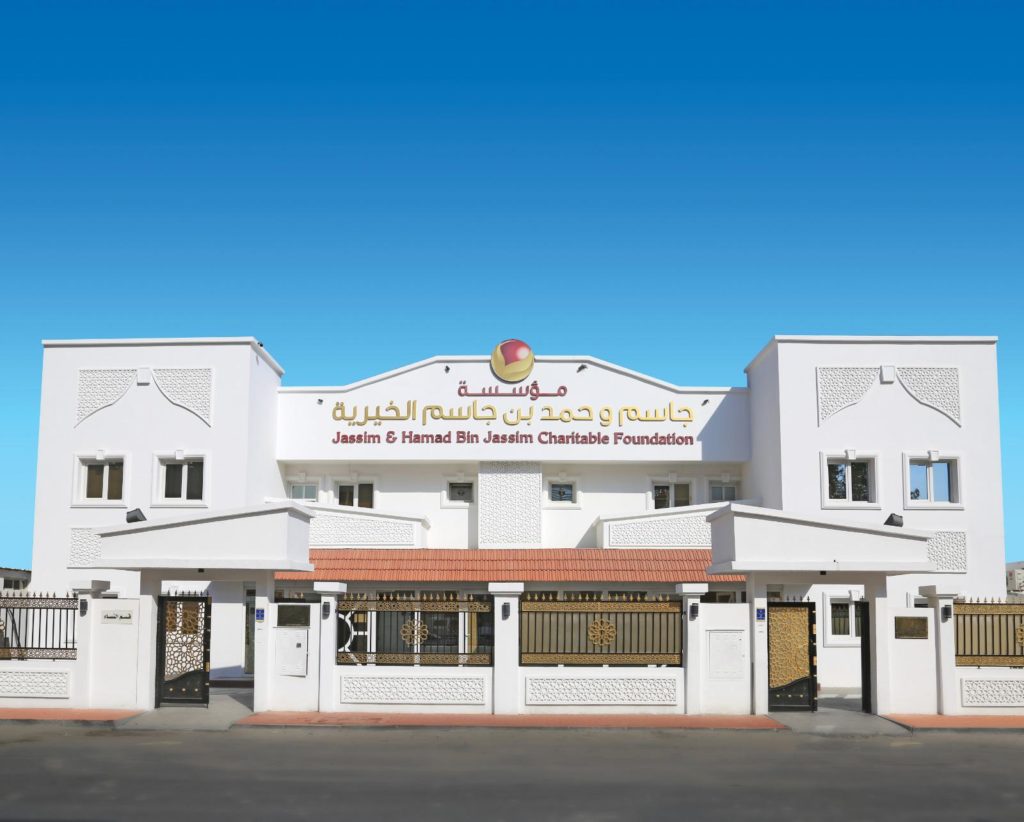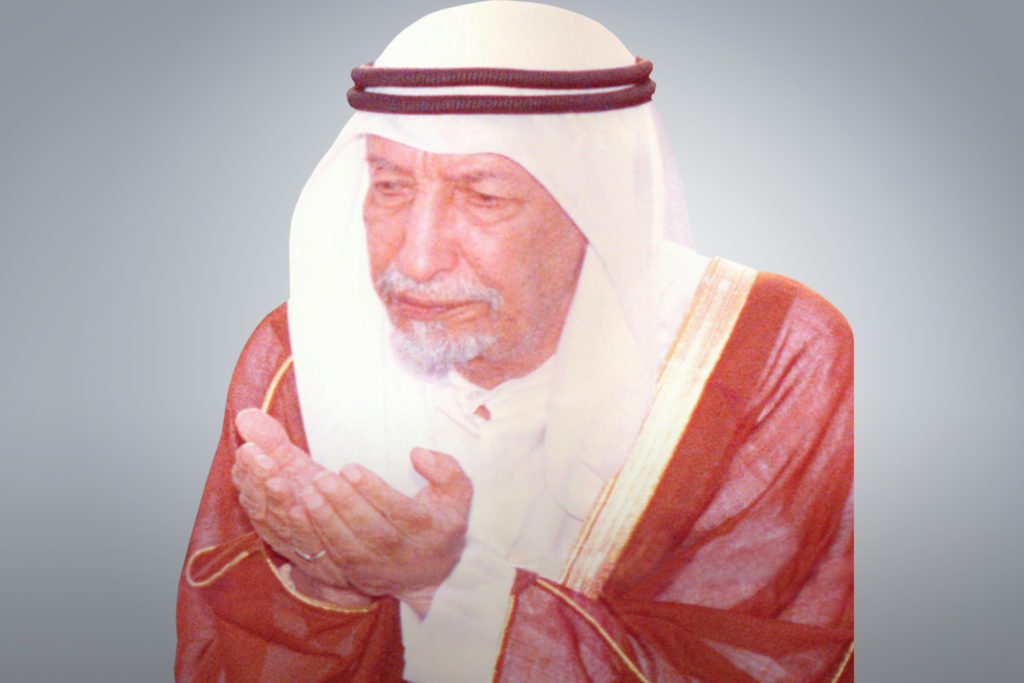A central social figure who is respected and loved by everyone
The late Sheikh Jassim, may he rest in peace, was keen on building mosques, following the example of the Prophet, peace be upon him. He established a total of 27 mosques in Qatar and other countries such as Oman, India, Saudi Arabia, and more.
Sheikh Jassim, may he rest in peace, was known for his devoutness, noble ethics, and high culture, which made him a central social figure who was respected and loved by everyone. His exceptional personality allowed him to keep his father’s council (after his father’s passing) open to everyone at a young age, even when he was no more than 16 years old.
Many stories of his generosity are attributed to him, one of the most notable being his continuous support for his father’s friends, offering various forms of support, including financial assistance and providing housing. He was known for his efforts to reconcile disputes, visiting the elderly, taking care of orphans, widows, and travelers, maintaining family ties, and often taking the initiative to pay blood money and free slaves. He became a refuge for many in need, especially during difficult times.
During challenging periods, many of Qatar’s residents turned to Sheikh Jassim, seeking his kindness and chivalry. His generosity and noble character made people confident that they could rely on him, and they would visit him with the belief that they would return with their needs met. He was highly praised for his courage, especially before the discovery of oil.
He was known for his dedication to assisting needy families and personally visiting them in their homes to ensure their needs were met discreetly. He would personally hand out the salaries of his employees, even though he had a manager for his affairs. He used to say, “I do not have servants or workers; everyone with me is like a brother.” He had a deep understanding of the people who came to him, allowing him to discern their needs before they even spoke. He was also known for rushing to help many families in different countries during times of famine by providing food and clothing.
Positive Impact
Among the acts of generosity associated with the personality of Sheikh Jassim bin Jabr bin Muhammad bin Thani, may he rest in peace, it is narrated by those close to him that he used to distribute the produce from the date farms he owned in Qatar and Saudi Arabia to the local residents free of charge.
As an extension of this good influence that he left behind during his lifetime, his children continued the legacy of giving. His son, His Excellency Sheikh Hamad bin Jassim bin Jabr Al Thani, initiated the establishment of the Jassim bin Jabr bin Muhammad Al Thani Charitable Foundation. The foundation left a clear imprint and had a significant impact not only on the local level but also internationally. Its charitable and humanitarian contributions varied and included the construction of schools, hospitals, educational and vocational institutes, centers for individuals with special needs, kidney dialysis centers, and residential villages to provide housing for those in need. The foundation also dug wells for drinking and irrigation water, provided relief to the needy wherever they were, and in 2013, His Excellency Sheikh Hamad added numerous real estate and financial investments to support the foundation, ensuring high annual returns to keep up with its expanding charitable and investment activities. Today, it is known as “Jassim and Hamad Bin Jassim Charitable Foundation.”
Social Relationships
Many contemporary individuals still remember the daily gatherings in the majlis (traditional meeting place) of the late Sheikh, may he rest in peace, where people from Qatar would come to greet him. He used to make an effort to visit many people at their workplaces, and many see this as a gesture to strengthen the bonds of love and brotherhood among the people of Qatar.
He disliked seclusion, and this was evident in his wide social relationships and special friendships with the people of Qatar. His honorable reputation also attracted many well-known scholars who would regularly visit him, forging special friendships. These scholars include the esteemed Sheikh Dr. Yusuf al-Qaradawi, the late Sheikh Abdullah al-Ansari, the late Sheikh Abdullah bin Zaid Al Mahmoud, the late Sheikh Hajr bin Hajr, and others, who would visit him at different times.
His fragrant biography, may God have mercy on him, also attracted many well-known scholars who visited him regularly, with whom he had a special friendship, such as His Eminence Sheikh Dr. Yusuf Al-Qaradawi, Sheikh Abdullah Al-Ansari, may God have mercy on him, Sheikh Abdullah bin Zaid Al Mahmoud, may God have mercy on him, and Sheikh Hajar bin Hajar, may God have mercy on him, and others visited him at different times.
His Lifestyle
“May Allah have mercy on him. He used to sleep very little at night, waking up a couple of hours before dawn for Tahajjud (night prayer). He would be one of the first to arrive at the mosque for Fajr prayer, and after that, he would return home and engage in reading the Quran until sunrise, following the noble Prophetic tradition. He walked daily between five to seven kilometers from his farm in Salwa to his residence.
He had regular meetings with His Highness Sheikh Khalifa bin Hamad Al Thani (may Allah have mercy on him) three times a week at his home and at the Amiri Diwan (the government house). He was at the forefront of receiving state guests and was consulted on matters of governance.
He established a commendable tradition, represented by his inclusive gatherings, which were described as schools of manhood, chivalry, and nobility. Those closest to him had priority in his daily activities, and he made sure that most of his family members were present in these gatherings, aiming to instill values of manhood and eloquence in those who sought his company. His gatherings were open throughout the day, where he provided relief and support to many people in their times of need. He was indeed a sociable person.
Whether in the old or new Al-Mirqab, his distinguished gatherings, characterized by dignity and respect, continued everywhere he went. They welcomed his Qatari and Gulf brothers alike. Whether in Britain, Germany, or Switzerland, his gatherings were always filled with guests, interspersed with occasional honor banquets for visiting guests or close friends. He never hesitated to provide assistance to anyone in need, and his generosity was closely linked to reconciliation. When parties in conflict turned to him, he would do everything in his power to reconcile them, often making it a condition for their request. With a simple life, he managed to solve many problems through his influence, efforts, and relentless commitment to bringing people together.”
Please note that this translation may not capture all the nuances and cultural context of the original text, but it conveys the general meaning.
His Hobbies
May Allah have mercy on him, Sheikh Jassem bin Jabor bin Mohammed Al Thani had a deep passion for camels and would occasionally participate in camel races, even organizing such races. He had gathered a substantial number of camels on his farm and generously gifted them to kings and princes in the Arabian Gulf region. He also had a strong affinity for firearms, collecting them in his home and treasuring them. He would share these firearms with those he held dear and was a skilled marksman himself.
One of his primary hobbies was hunting, and he remained devoted to this pastime whenever the opportunity allowed. He would embark on hunting trips to Saudi Arabia, Oman, and Hadramout. Additionally, he was known for his interest in collecting valuable items such as amber, oud (agarwood), and rare pearls.
Educational vision
He was known for his possession of a conscious educational vision. He raised his children with discipline and a strong work ethic. He consistently monitored their news and well-being from their childhood, especially concerning the performance of their religious duties in their designated times. When some of them traveled abroad for studies, he was keen on staying in touch with them. One of his recommendations to his children was to prioritize seeking the pleasure of God, and then the satisfaction of people. For him, pleasing God was a life principle that should manifest in all the actions of his children.



